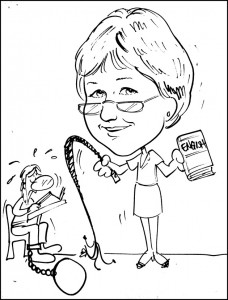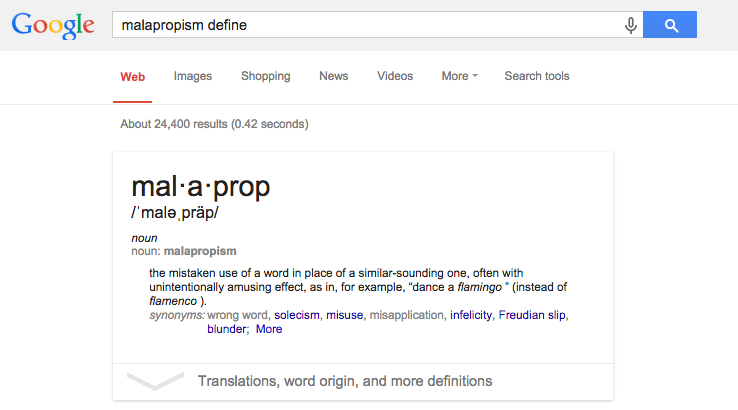Malapropism [mal–uh-prop-iz-uh m] n. — The habit of misusing words to hilarious effect, often by confusing words that sound similar.
Over forty years ago, my husband, an Army instructor of missile maintenance, sometimes came home with tales of language gaffes committed by fellow officers. Believe me: he is not overly fastidious about his own usage. He admits that his vocabulary is sometimes lacking, so when he reaches for just the right word and it eludes him, he just invents one, often to humorous effect. In his case, the “mistakes” are intentional, and intentionally funny.
Not so with his fellow officers. One had frequent problems with pronunciation, a common failing of people who read a word but never hear it spoken. Whenever he saw the word “facsimile,” he read it as “face smile.”
Others in his office obviously heard a word frequently but never saw it written. The end of each fiscal year had them scrambling to submit paperwork. Several invoked the term “physical year” promiscuously.
Does anyone really think that nobody notices language misuse? Both he and I still laugh about these whoppers four decades later.
“Mrs. Malaprop” Invades the Office
Richard Sheridan’s eighteenth-century play The Rivals is now largely obscure, except for one memorable character, Mrs. Malaprop (from the French mal a propos), who habitually replaced words with others that sound similar. In doing so, she added a word to the English dictionary: Malapropism. One of her humorous similes described another character as “headstrong as an allegory on the banks of the Nile.”
Most misuse of words in the business world are more subtle malapropisms, not as humorous but noticeable, nevertheless. And they may go home with a co-worker to entertain the family over dinner.
Let’s examine a few words or word pairs that many people commonly confuse in speech and writing.
Jive-Jibe
Jive is foolish talk attributable to music and hipsters. As a verb, it can mean either to dance or mislead. This has become popularized through the jargon of swing music.
In the Mirriam-Webster dictionary, jive falls into three categories:
[list type=”check”]
- Swing music or the dance performed to it
- Glib, deceptive, or foolish talk; jargon of hipsters
- A special jargon of difficult or slang terms
[/list]
It’s difficult to imagine a use for this word in the business setting.
Jibe, on the other hand, is often the word people actually mean when they say “jive.” A verb, it means “to agree or be in accord with.”
Example: The conclusion you’ve reached does not jibe with the evidence.
Simple-Simplistic
Few folks misuse the word “simple,” unless they are attempting to make a simple statement sound profound. These are also the ones who use “employ” or “utilize” instead of “use.”
Simple means what we all know it means: ordinary, plain, unadorned, uncomplicated. Hard to misuse, right?
Simplistic goes a couple of steps further. This word describes that which is oversimplified, treating something complicated as simpler than it is.Using “simplistic” when you mean “simple” is a common error. But “simplistic” doesn’t mean “extra-simple.” It has a slightly negative connotation that “simple” lacks—a sense of naivete.
Example: His belief that people are basically good is simplistic.
Farther-Further
This is an easy one if you use a simple mnemonic.
Farther denotes physical distance. You must drive farther on I-65 to find an open diner. The mnemonic is the stem of the word, far.
Further refers to depth or non-physical distance. This word covers much more territory than “farther.” It may relate to time, depth, or effort. One may delve further into a topic or examine an idea further.
The distinction between these two words is becoming blurred through usage, with “further” often used (incorrectly) to refer to physical distance.
Literally
The word means “exactly,” to be taken in a literal sense. The comedy of the children’s books about Amelia Bedelia depends on Amelia’s taking every statement or instruction 100% literally. When told to dust the furniture, she does just that and sprinkles a layer on every surface.
If used according to its true definition, “literally” would rarely be used in conversation.
Which brings us to the problem. Because of its overuse and abuse, even dictionaries have answered to the call. Google the word, and you will find a secondary definition that twists the word out of all recognition. It becomes popularized as a means of showing emphasis or emotion, as in:
That subject is literally too hot to handle.
The previous sentence makes no sense. Subjects can’t be “literally hot.” Moreover, used in this context, the word becomes a filler, plumping up language, and a weasel word, giving more emphasis or meaning than a statement deserves.
Probably best to use it as you do criticism: sparingly and to effect.
Apprise-Appraise
Appraise: (Verb) In my long life, I have seldom used the word “appraise,” and then only in reference to property. It means “to set a price or value on.” I realize that some professions use the word frequently, and then specifically relating to value. You may appraise physical property, or you may use the word metaphorically as in the following: The world cannot appraise what only the heart knows as worth.
Apprise: The problem often occurs with the word “apprise” because sometimes we read what we think we see instead of what we really see, and we see “appraise.” Also a verb, “apprise” simply means “to inform or tell someone something.” Even then, it is a bit pretentious. “The management wishes to apprise all employees of the upcoming training sessions.” Just a touch formal, huh? And boring?
How about this instead: We’d like to notify all employees about the following training sessions.
Conclusion
Sometimes the English language seems like a minefield (not literally). But if you follow the one simple (not simplistic) rule of writing, your journey to clarity will not be so treacherous: Simplify. Keep it simple and straightforward. A good vocabulary isn’t about impressing anybody. It’s about using just the right word, suitable for the job and appropriate to the occasion.
And if you’re not sure about a word, look it up. You don’t even need to own a dictionary. Just Google the word you want plus the word “define,” and you’ll get a dictionary entry.
 About the Author:
About the Author:
The Grammar Examiner taught high-school English for 40 years and was recognized by her citywide public school system as an outstanding ACT-prep instructor.
A tough-love drill sergeant in the classroom, she was affectionately known as “The Dragon Lady” by her students, who dared not call her by this name in person.


